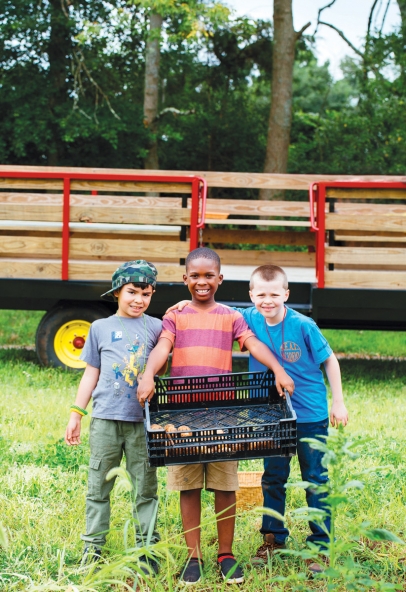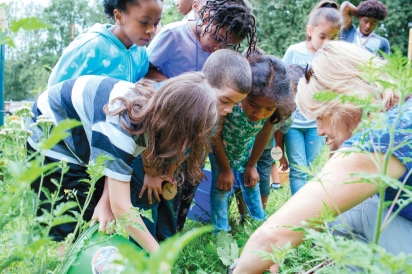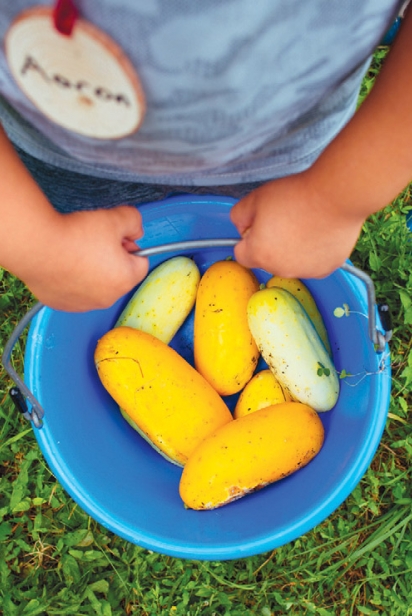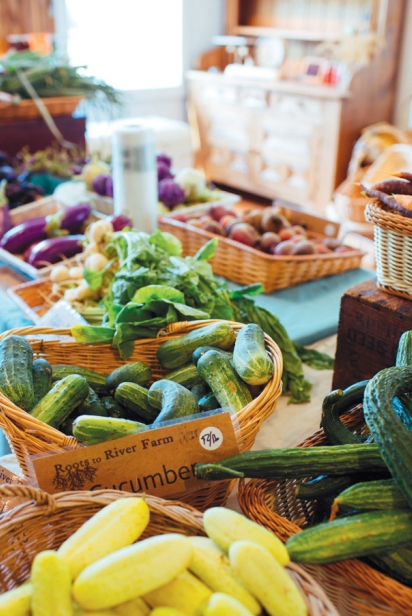Fertile Ground
Community grows at Gravity Hill Farm
Janet Nocar is always looking for hands-on ways for students to learn about health and nutrition. Nocar is a nurse at Lambertville Public School and has a background in health education. As happenstance would have it, during a visit to Gravity Hill Farm in Titusville five years ago, she met the farm’s owner, Maria Nicolo, who shared that same vision. Lambertville Public School went on to became the farm’s pilot program, where students got to learn first-hand how their food is grown by exploring the farm and eating fresh vegetables while standing in the very fields where they were cultivated..
“When children who don’t like eating vegetables see their peers get excited about trying them, they are more likely to try them too,” she says. “It’s great to watch that hesitation disappear and their curiosity grow.”
Today, the program lives on. Thirty elementary school students come in both the spring and the fall, not only to see how the farm and crops change, but also to learn about nutrition, processed foods and how to plant seeds, and to taste and discover vegetables that help build strong bones. Students also learn about hydroponics and solar energy, both of which are features of the farm. Teachers work with the farmers, coordinating themes the children are learning in school and applying them to the many resources available at the farm.
“They love the experience of learning on the farm rather than being in the classroom,” she says. “It’s something they talk about and look forward to each year.”
Today, Gravity Hill Farm provides an educational space for local community organizations and schools, such as Bear Tavern Elementary in Titusville, Christina Seix Academy in Trenton, Mobile Minds of New Jersey and many others.
Situated atop a hill, the 46-acre farm offers quite a setting to learn, with stunning views of growing fields, grazing animals, rustic red barns and surrounding natural beauty.
This year, Gravity Hill Farm has expanded its reach, and is now home to The Farm Cooking School [see sidebar], Roots to River Farm, Locust Light Farm and a new educational space called The Barn at Gravity Hill.
The farm, owned by Maria Nicolo and David Earling, was created in 2005. While neither had a background in farming, Nicolo had a ceaseless passion for teaching.
A former television producer for PBS, Nicolo worked for many years creating documentaries that focused on international issues.
“Making documentaries was like teaching public education. It was a way to tell stories and help people understand issues that may be difficult to penetrate,” she says.
After 15 years in the business, she had an experience while shooting a documentary in a small village in Africa that prompted her to leave television to follow her passion.
“The inhabitants of this village with very few resources asked how their village would benefit from this film, and I had to explain how it’s helping people understand issues and affecting long-term change,” says Nicolo. “But they didn’t want long-term change. They wanted resources that were going to help them and their families now.”
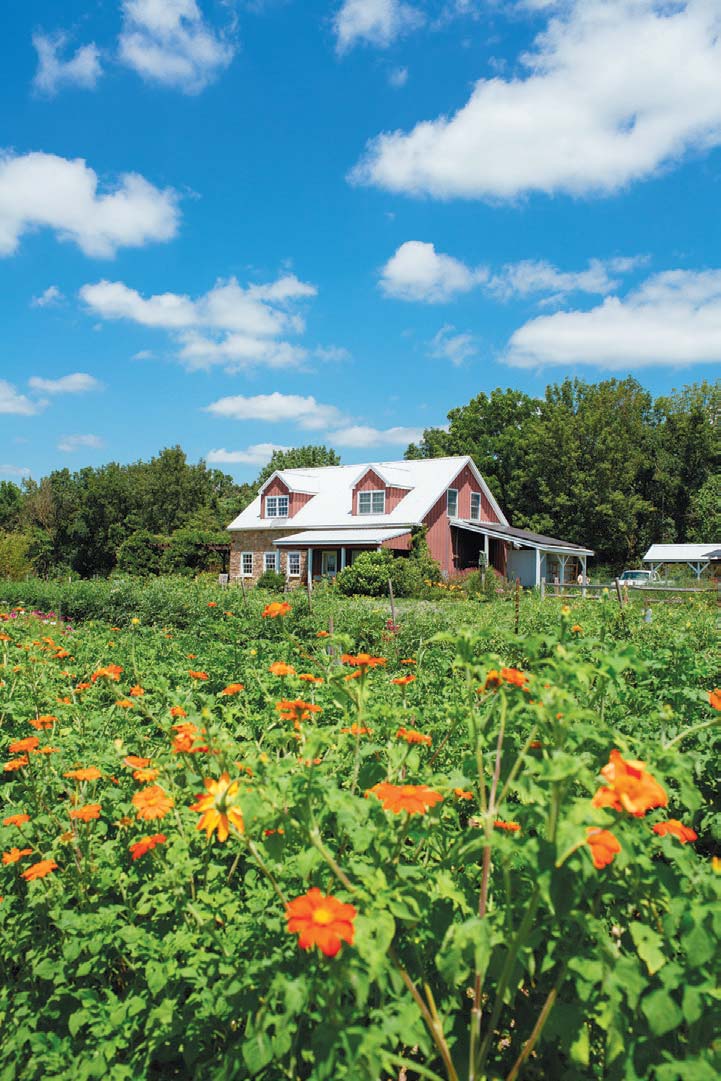
“I wanted to improve people’s
everyday lives immediately.
The farm provides short-term
local change—hopefully
with a lifetime effect.”
—Maria Nicolo, Gravity Hill Farm
Being a new mother, Nicolo decided to make this her focus, and she left filmmaking to get her master’s degree in community building and education.
“I wanted to improve people’s everyday lives immediately,” she says. “The farm provides short-term local change—hopefully with a lifetime effect.”
Gravity Hill Farm grew into a bustling farm and farmers’ market, providing organic vegetables to the community and hosting various educational groups centered on farming, nutrition and more. For Nicolo, though, managing a farm in addition to organizing educational programs and hosting school groups became a lot to handle. Once again, a change was needed.
“We realized we weren’t getting the chance to really focus on the educational programs as much as we wanted to—or spend enough time with the animals,” Nicolo says. The farm is home to an assorted collection of llamas, alpacas and goats. This year, Popcorn the donkey gave birth to a foal named Jiffy.
“It became hard to lead programs and take care of the animals in between market hours, growing and harvesting.”
Thus, The Barn at Gravity Hill was born, a barn from the 1740s renovated to be used primarily for community education programs.
“The Barn at Gravity Hill is focused on being a space for non-profits, schools and community-based organizations. Offering the resources, location and facility to groups who are trying to make an immediate difference in our community helps further both our mission and theirs.”
The Barn earns income from commercial rentals such as weddings and corporate events. That money helps fund the space for non-profits and community-based organizations to host programs and events, and, sometimes, aids in the cost of transportation to get there.
Since The Barn is new this spring, Nicolo is excited to continue with the programs already in place, as well as expand their education initiative.
“We’re starting new partnerships with area groups who can use the barn as a resource,” she says. “When it comes to creating community, the first thing you need is a place, and we’re happy to be able to provide that for those who need it.”
With their focus now being entirely devoted to The Barn, Nicolo and Earling knew they couldn’t let the community that was built around the farm and market go to waste.
“We knew we wanted to provide an opportunity for a young farmer to lease the land and build on the momentum of what had taken us years to create,” she says. One of their early farm apprentices, Malaika Spencer, who now owns Roots to River Farm, was their first pick. “When we asked her and she said yes, we were thrilled.”
Roots to River took on the lease of the Gravity Hill Farm growing fields this January. The farm offers a CSA as well as a market that’s open to the public on weekends. The farm grows everything from carrots to tatsoi, and specializes in heirloom varieties.
“It’s exciting to expand our operation and be able to do so in one of the places where farming began for me,” says Spencer, who still operates her original location in New Hope, PA. “It’s a great partnership. All the previous farm managers worked so hard to create a customer base that we’ve been able to plug right into. We couldn’t have asked for a better situation.”
In the near future, Spencer intends to put in a pick-your-own garden to encourage and foster interaction. “Getting to see, feel and touch gets you excited about how plants grow and provides a holistic education for both kids and adults, and like Maria, we are passionate about teaching the importance of how eating well can taste good,” she says. “These are the connections that can change food systems, change minds, change habits and get people more invested in their food choices and how they eat.”
Locust Light Farm has recently joined the property as well. The herb farm is owned by Amanda Midkiff, who began her journey growing medicinal herbs while working on vegetable farms—namely Roots to River Farm, when it was just getting started.
“It’s wonderful to be collaborating with Malaika again, and it’s great to work with a team and community while still working on my own project,” says Midkiff, who will be setting up her gardens in the Roots to River growing fields. “The work we’re doing complements each other so well.”
Locust Light Farm was started in 2015 in Bucks County, PA. Midkiff grew more than 60 varieties of herbs and offered an herbal CSA and herbalism classes.
“It’s been my dream to have my farm be in a space the community could easily access, where I could teach classes right in the garden so people could interact with the plants,” she says. “Moving Locust Light Farm to the Gravity Hill Farm property is giving me the opportunity to do just that.”
By the fall, Midkiff hopes to have medicinal and culinary herb gardens under way, which will act as teaching gardens for The Farm Cooking School and The Barn at Gravity Hill, and which will supply herbs to the Roots to River farmers’ market and CSA.
It’s rare to find a place where multiple visions overlap to support a growing mission to learn, sustain and educate. Gravity Hill Farm seeks to nourish us all.
GRAVITY HILL FARM
67 Pleasant Valley Rd., Titusville
609.737.2834 gravityhillfarm.com
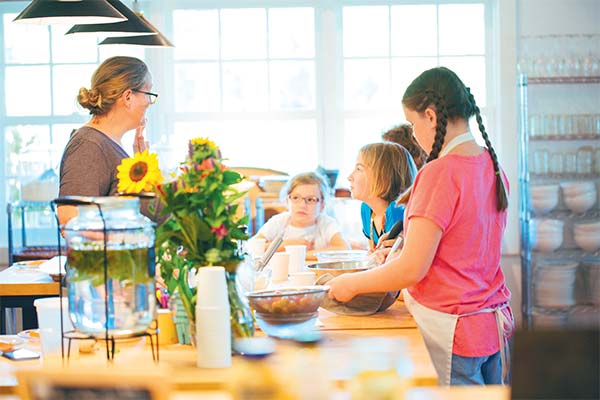
Shelley Wiseman, left, teaching a class at The Farm Cooking School
THE FARM COOKING SCHOOL AT GRAVITY HILL FARM
Ian Knauer and Shelley Wiseman, who met while working for Gourmet, founded The Farm Cooking School in 2014. They moved their operation to Gravity Hill Farm last November.
“It feels like we’ve won a prize,” says Knauer. “It’s the perfect collaborative opportunity.”
The idea of creating a cooking school came about in 2012 after Knauer visited and fell in love with the area, moving there shortly thereafter.
“There were so many butchers, farmers, brew masters and dairies doing amazing things here,” he said. “It seemed like fertile ground to create a place where it could all come together for people learn about.”
The original location of the school was at Tullamore Farms in Stockton, but Knauer and Wiseman soon outgrew the space. When the opportunity arose to move their operation to the Gravity Hill Farm property, they couldn’t say no.
“There were facilities already there, like a commercial kitchen and an outdoor pizza oven and walk-in refrigerator,” he says. “Having a larger space has allowed us to increase our attendance by at least half, and often classes sell out.”
Cooking classes are available for both kids and adults, and range from knife skills and butchery to pickling and cheese making. The surrounding rolling hills and rustic environment makes the atmosphere comfortable and unique.
“Other cooking schools are set up like restaurant schools, where everything is stainless steel, creating an intimidating environment. But our school is in a barn, on a farm, in New Jersey, which knocks down those barriers.” Not only do the classes help people learn and connect better with their food, they are also a way for people to connect with the bounty of the surrounding local farms.
“If we have an item on the menu from a nearby farm, we’ll make it a point to encourage people to go visit [that farm] to see how it’s grown or made,” he says.
Classes often feature local artisans. Jonathan White of Bobolink Dairy and Bakehouse conducts a bread-making class; Brendon Anderson from Triumph Brewery teaches beer making at home. Gabrielle Carbone of The Bent Spoon offers a class on making ice cream.
“The students get to know the farmers, brewers and cheese makers, and it makes that artisan growing and producing community very accessible,” Knauer says. “If that in itself continues to grow, that alone makes this place a success.”
On weekends, The Farm Cooking School has samples and lunch available for market goers, which highlight produce available at Roots to River Farm. Often, it’s a great chance to learn creative ways to prepare foods one may not be so familiar with—such as escarole or kohlrabi.
For a complete calendar of cooking classes and events, visit thefarmcookingschool.com. —L.J.
THE FARM COOKING SCHOOL
67 Pleasant Valley Rd.,
Titusville
646.236.0605
thefarmcookingschool.com


